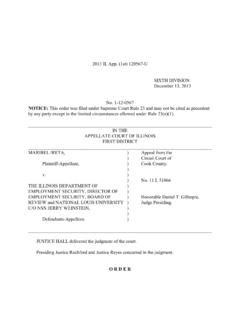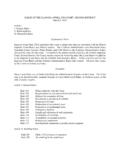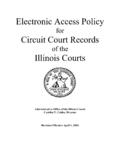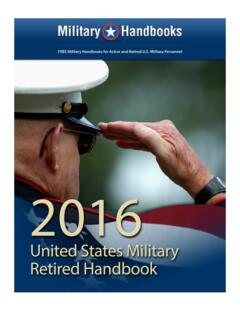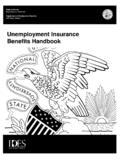Transcription of Faherty v. Illinois Department of Employment …
1 2014 IL App (1st) 133359-U SECOND DIVISION January 20, 2015 No. 1-13-3359 NOTICE: This order was filed under Supreme Court Rule 23 and may not be cited as precedent by any party except in the limited circumstances allowed under Rule 23(e)(1). _____ IN THE APPELLATE COURT OF Illinois FIRST JUDICIAL DISTRICT _____ AINE Faherty , ) Appeal from the ) Circuit Court of Plaintiff-Appellee, ) Cook County. ) v. ) ) Illinois Department OF Employment ) security ; DIRECTOR OF Illinois Department ) OF Employment security ; and BOARD OF ) REVIEW, ) No. 13 L 50064 ) Defendants-Appellant, ) ) and ) ) AMERICAN AIRLINES, ) Honorable ) Robert Lopez Cepero Defendant.
2 Judge Presiding. _____ PRESIDING JUSTICE SIMON delivered the judgment of the court. Justices Pierce and Liu concurred in the judgment. O R D E R 1 Held: Where evidence established that an employee was discharged for stealing a dress from a passenger's garment bag, the Board of Review for the Illinois Department of Employment security 's determination that the employee committed theft making her ineligible for unemployment benefits pursuant to section 602(B) of the Unemployment Insurance Act (820 ILCS 405/602(B) (West 2012)) was not No. 1-13-3359 - 2 - clearly erroneous; circuit court's decision is reversed and Board's decision is reinstated.
3 2 Defendant, the Board of Review (the Board) of the Illinois Department of Employment security (IDES), appeals the order of the circuit court reversing the Board's decision to deny unemployment benefits to plaintiff Aine Faherty , a former customer service agent for American Airlines (American). On appeal, the Board contends its determination that plaintiff committed theft in connection with her work pursuant to section 602(B) of the Unemployment Insurance Act (the Act) (820 ILCS 405/602(B) (West 2012)) was not clearly erroneous. We reverse the judgment of the circuit court and reinstate the decision of the Board. 3 Initially, we note that plaintiff has not filed a brief in response to defendant's contentions.
4 However, we have the authority to decide the merits of this appeal because the record is simple and the claimed errors are such that we can decide them without the assistance of an appellee's brief. People v. Cosby, 231 Ill. 2d 262, 285 (2008) citing First Capitol Mortgage Corp. v. Talandis Construction Corp., 63 128, 133 (1976). 4 Plaintiff worked at American Airlines at O'Hare Airport from May 1985 to June 2012. She was discharged on June 19, 2012 for allegedly stealing a passenger's dress from a garment bag that had been left behind on a plane. According to American, plaintiff had been discharged for theft, which is a violation of company policy prohibiting dishonest conduct.
5 During American's initial investigation of the theft, plaintiff wrote: "On May 22nd at [Gate] K4. I did steal a Womens Dress that was left by a passanger [sic] at K4. My Apology for this doings [sic]. I have no answer as of why I did this, I never stole anything before, American has always been good to me." No. 1-13-3359 - 3 - When plaintiff applied for unemployment benefits , she submitted an online misconduct questionnaire to the IDES where she stated that the reason given by American for her discharge was that she "stole an item from a departure gate." She stated the circumstances that led to the discharge as "Mental Health, I was crying out for help!
6 " She acknowledged the rule that "employees must not steal company items or employees items," and stated that there was no effect on American because "she returned the items stolen." 5 American submitted a letter to IDES protesting plaintiff's claim. In the letter, American contended that defendant was not eligible for unemployment benefits stating that she was "discharged for violation of a reasonable and known policy" when she "admitted that she took a passengers [sic] lost dress that was left at Gate K4. She removed the dress from the Nordstrom's bag and placed it in her backpack." American further wrote that plaintiff acknowledged receipt of the company handbook at the time of hire, which clearly outlines the company policy and procedures and her action constituted a "willful disregard of the employer's best interests.
7 " 6 American also attached an investigation report in which Maggie Molander, plaintiff's supervisor, stated that "[plaintiff] was aware that [her] actions were wrong and violated policy but [she] could not give a good answer to why [she] took the dress and also why [she] didn't bring it back." Molander stated that plaintiff's action were a direct violation of American Airlines rules and regulations. 7 During an interview with an IDES claims adjudicator, plaintiff stated that she had intended to take the dress to the lost-and-found area, placed it in her bag, but then forgot and took it home. She told an unidentified coworker that she had taken the dress home, and forgot to bring it back.
8 She brought the dress back three weeks after taking it home when she heard American was asking about it. She denied that she admitted to stealing the dress, stating "I No. 1-13-3359 - 4 - totally forgot about the dress." The Board denied plaintiff's claims because she admitted the theft and found that she was disqualified from receiving unemployment benefits under Section 602(B) of the Act. 8 Plaintiff sent a letter to IDES requesting reconsideration of the claims adjudicator s decision, and attached her prescription for anti-depressants and a doctor's note which stated that defendant "acted out of character as a cry for help." Plaintiff attributed her actions to anxiety and depression.
9 She also stated that the dress was not even her size. 9 The claims adjudicator denied plaintiff's request, nothing that she had admitted stealing the dress in a signed statement to American and in the misconduct questionnaire she submitted to IDES. Plaintiff then appealed and requested an evidentiary hearing before a referee. 10 During the evidentiary hearing, Molander testified that on May 22, 2012, a passenger left a woman's dress behind and had called to inquire if someone had found it. On June 15, 2012, plaintiff was questioned because she was working at a gate area where the garment had been seen. Plaintiff admitted to taking the dress, and told Molander that the dress was a type that she has been looking for to wear to a wedding.
10 She hid the dress behind the podium while she worked a flight, then removed the dress from the garment bag and placed it into her backpack. Plaintiff believed the dress was worth about $200 to $300. She denied wearing the dress. Molander opined that the employer was harmed because the "passenger was gonna [sic] file a claim because she left her item." Plaintiff did not bring the dress to Molander, but the dress was subsequently returned. 11 Plaintiff testified that she looked in the garment bag because it was on the desk on the captain's paperwork. She moved the bag and put it behind the desk. After working her flight, plaintiff intended to take the dress to lost and found; however, she did not do that because she No.
